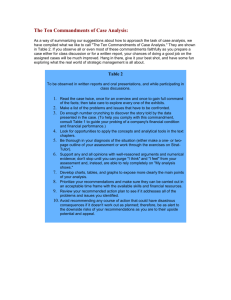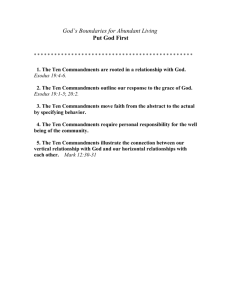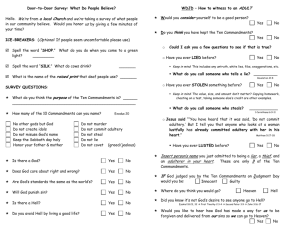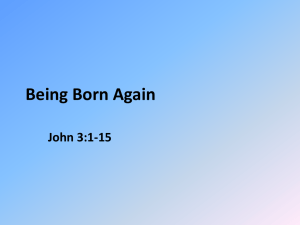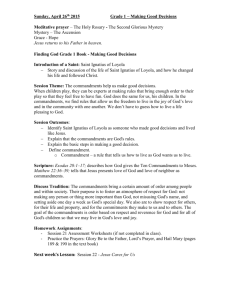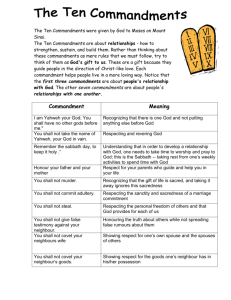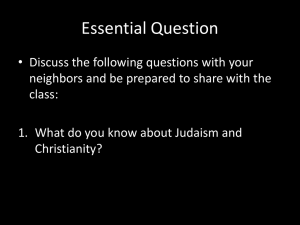Topic: The Ten Commandments
advertisement
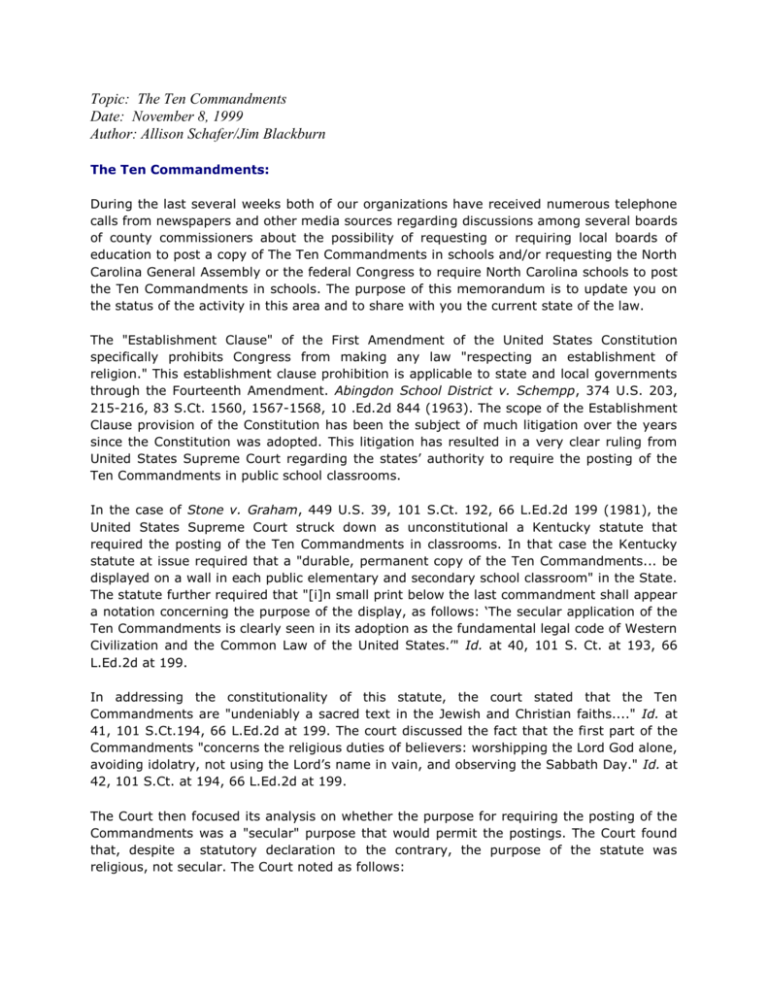
Topic: The Ten Commandments Date: November 8, 1999 Author: Allison Schafer/Jim Blackburn The Ten Commandments: During the last several weeks both of our organizations have received numerous telephone calls from newspapers and other media sources regarding discussions among several boards of county commissioners about the possibility of requesting or requiring local boards of education to post a copy of The Ten Commandments in schools and/or requesting the North Carolina General Assembly or the federal Congress to require North Carolina schools to post the Ten Commandments in schools. The purpose of this memorandum is to update you on the status of the activity in this area and to share with you the current state of the law. The "Establishment Clause" of the First Amendment of the United States Constitution specifically prohibits Congress from making any law "respecting an establishment of religion." This establishment clause prohibition is applicable to state and local governments through the Fourteenth Amendment. Abingdon School District v. Schempp, 374 U.S. 203, 215-216, 83 S.Ct. 1560, 1567-1568, 10 .Ed.2d 844 (1963). The scope of the Establishment Clause provision of the Constitution has been the subject of much litigation over the years since the Constitution was adopted. This litigation has resulted in a very clear ruling from United States Supreme Court regarding the states’ authority to require the posting of the Ten Commandments in public school classrooms. In the case of Stone v. Graham, 449 U.S. 39, 101 S.Ct. 192, 66 L.Ed.2d 199 (1981), the United States Supreme Court struck down as unconstitutional a Kentucky statute that required the posting of the Ten Commandments in classrooms. In that case the Kentucky statute at issue required that a "durable, permanent copy of the Ten Commandments... be displayed on a wall in each public elementary and secondary school classroom" in the State. The statute further required that "[i]n small print below the last commandment shall appear a notation concerning the purpose of the display, as follows: ‘The secular application of the Ten Commandments is clearly seen in its adoption as the fundamental legal code of Western Civilization and the Common Law of the United States.’" Id. at 40, 101 S. Ct. at 193, 66 L.Ed.2d at 199. In addressing the constitutionality of this statute, the court stated that the Ten Commandments are "undeniably a sacred text in the Jewish and Christian faiths...." Id. at 41, 101 S.Ct.194, 66 L.Ed.2d at 199. The court discussed the fact that the first part of the Commandments "concerns the religious duties of believers: worshipping the Lord God alone, avoiding idolatry, not using the Lord’s name in vain, and observing the Sabbath Day." Id. at 42, 101 S.Ct. at 194, 66 L.Ed.2d at 199. The Court then focused its analysis on whether the purpose for requiring the posting of the Commandments was a "secular" purpose that would permit the postings. The Court found that, despite a statutory declaration to the contrary, the purpose of the statute was religious, not secular. The Court noted as follows: This is not a case in which the Ten Commandments are integrated into the school curriculum, where the Bible may constitutionally be used in an appropriate study of history, civilization, ethics, comparative religion or the like.... Posting of religious texts on the wall serves no such educational function. If the posted copies of the Ten Commandments are to have any effect at all, it will be to induce the schoolchildren to read, meditate upon, perhaps to venerate and obey, the Commandments. However desirable this might be as a matter of private devotion, it is not a permissible state objective under the Establishment Clause. Id. at 42, 101 S.Ct. at 194, 66 L.Ed.2d 199. Whatever anyone’s personal beliefs, at this point it is clearly contrary to United States Supreme Court precedent to display the Ten Commandments on classroom walls for the purpose of inducing children to obey them. Absent a United States Supreme Court decision in which the Court reverses itself or a change in the United States Constitution, we are bound by the Supreme Court’s interpretation of the Constitution. It is our understanding that there is provision in a federal House of Representatives Juvenile Justice bill that seeks to mandate the posting of the Ten Commandments. The Senate version does not contain a similar provision. We are informed that the bill is in conference. Such a bill, if enacted, would certainly be the subject of litigation by groups, such as the American Civil Liberties Union (ACLU), that monitor such issues. The current Supreme Court precedent would suggest that such a statute would not withstand constitutional scrutiny by the federal courts. We hope you will find this information helpful as your advise your boards when they consider requests to endorse the call to post the Ten Commandments in schools. Please feel free to call either of us if you wish to discuss this topic further. cc: All Chairmen of Boards of County Commissioners All County Managers All Chairmen of School Boards All Superintendents Ron Aycock, Executive Director, North Carolina Association of County Commissioners Ed Dunlap, Executive Director, North Carolina School Boards Association
